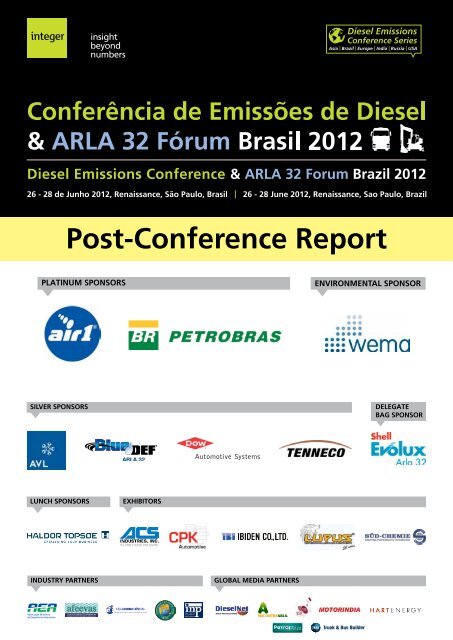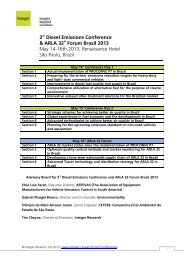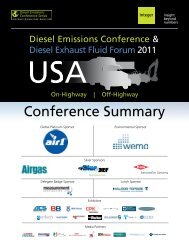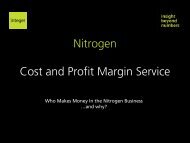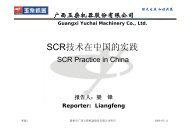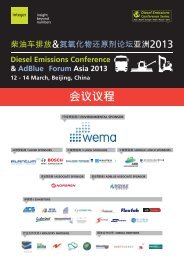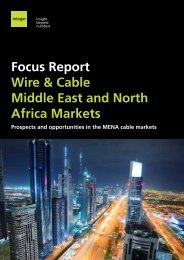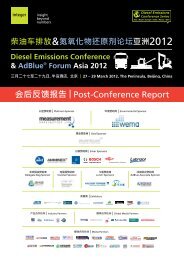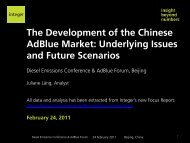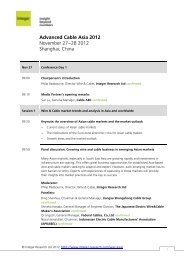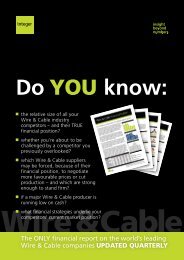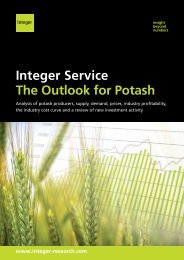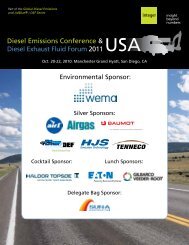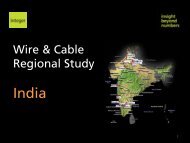Post-Conference Report - Integer Research
Post-Conference Report - Integer Research
Post-Conference Report - Integer Research
You also want an ePaper? Increase the reach of your titles
YUMPU automatically turns print PDFs into web optimized ePapers that Google loves.
Associação Brasileira<br />
de Engenharia Automotiva<br />
Associação Brasileira<br />
de Engenharia Automotiva<br />
Associação Brasileira<br />
de Engenharia Automotiva<br />
Associação Brasileira<br />
de Engenharia Automotiva<br />
beyond<br />
numbers<br />
- USA<br />
insight<br />
beyond<br />
numbers<br />
Diesel Emissions<br />
<strong>Conference</strong> Series<br />
Asia | Brazil | Europe | India | Russia | USA<br />
Diesel Emissions <strong>Conference</strong> Series<br />
Asia | Brazil | Europe | India | Russia | USA<br />
<strong>Post</strong>-<strong>Conference</strong> <strong>Report</strong><br />
PLATINUM SPONSORS<br />
ENVIRONMENTAL SPONSOR<br />
SILVER SPONSORS<br />
DELEGATE<br />
BAG SPONSOR<br />
LUNCH SPONSORS<br />
EXHIBITORS<br />
INDUSTRY PARTNERS<br />
GLOBAL MEDIA PARTNERS<br />
Associação Brasileira<br />
de Engenharia Automotiva
in<br />
b<br />
n<br />
Contents<br />
in<br />
b<br />
n<br />
<strong>Conference</strong> analysis ..............................................................................................3 - 11<br />
Attendee demographics ............................................................................................12<br />
Testimonials ..............................................................................................................13<br />
Closing remarks .........................................................................................................14<br />
<strong>Integer</strong> & <strong>Conference</strong>s<br />
<strong>Integer</strong> <strong>Research</strong> is a provider of key business information, market forecasts and commercial strategy<br />
consulting. We are not a ‘conference company.’ <strong>Conference</strong>s are simply an extension of our core<br />
business. It is the reputation of <strong>Integer</strong>, our market knowledge, and our contacts that enable us to<br />
produce the industry’s leading Diesel Emissions <strong>Conference</strong> series. This places <strong>Integer</strong> in a unique and<br />
privileged market position and allows us to provide the industry with a comprehensive forum to meet,<br />
discuss and debate on the latest industry issues.<br />
In 2012, the Diesel Emissions <strong>Conference</strong> Series will cover Russia & CIS, Asia, South America, Europe,<br />
India and North America.<br />
<strong>Post</strong>-<strong>Conference</strong> Analysis: Diesel Emissions <strong>Conference</strong> & ARLA 32 Forum Brazil 2012<br />
2
in<br />
b<br />
n<br />
Analysis<br />
in<br />
b<br />
n<br />
Day 1<br />
The conference began with an introduction from<br />
<strong>Integer</strong>’s Director of Emissions, Tim Cheyne, who<br />
highlighted the challenges that the Brazilian<br />
market has experienced through the first half of<br />
2012. There is no option to further delay emissions<br />
regulations and so the industry must find ways<br />
of helping customers face the challenges after 6<br />
months of PROCONVE P7. Discussions looking<br />
ahead to PROCONVE P8 and light duty sectors<br />
were also highly anticipated.<br />
Keynote Session 1: The transition<br />
between PROCONVE P5 and PROCONVE<br />
P7 in Brazil<br />
Lucio Flavio Bicalho, Director of Customer<br />
Satisfaction and Quality, Iveco Latin America<br />
Ltda., started proceedings with a presentation<br />
introducing Iveco’s new generation of ECOLINE<br />
engines designed to meet P7. More than 200<br />
vehicles were durability tested across 5 million<br />
kilometres of road in Brazil. Emphasis was placed<br />
on the need to acknowledge that experiences in<br />
Europe and North America are not always directly<br />
applicable elsewhere, and that a fundamental<br />
challenge in meeting P7 is going to be utilising the<br />
experience in other regions like Brazil, where the<br />
landscape presents a completely different situation<br />
than other markets. While the use of ARLA 32 is<br />
required for engines with SCR-equipped vehicles,<br />
Iveco decided to use both SCR and EGR in its latest<br />
engine range, and defends both technologies.<br />
Domingos Carapinha, Chief Engineer, MWM<br />
International Indústria Automotiva da<br />
América do Sul continued by sharing how MWM<br />
approached implementation of PROCONVE P7 in<br />
its MaxxForce heavy duty engine range, as well<br />
as the potential synergies in off-road platforms.<br />
The presentation focussed on the efficient use of<br />
development time through the use of geometric<br />
optimisation and development of vehicle<br />
performance simulation. In MWM’s current Euro V<br />
engine line, new components were added to the<br />
five core areas of the engine structure, combustion<br />
system, air management system, after-treatment<br />
and electronics (including OBD), resulting in an<br />
estimated 6-7% cost increase. Carapinha cited<br />
complications associated with fuel injection, due to<br />
space issues around the radiator, as the reason for<br />
switching from standalone EGR in North America<br />
to SCR technology in Brazil.<br />
<strong>Post</strong>-<strong>Conference</strong> Analysis: Diesel Emissions <strong>Conference</strong> & ARLA 32 Forum Brazil 2012<br />
3
in<br />
b<br />
n<br />
Analysis (cont.)<br />
in<br />
b<br />
n<br />
To end the first session of the day, Nilton<br />
Monteiro, Executive Director of AEA (Brazilian<br />
Automotive Engineering Association),<br />
moderated a discussion on the development<br />
of emissions legislation in Brazil so far, and<br />
the challenges likely to be faced in the future.<br />
The two keynote speakers were joined on the<br />
panel by Alexandre Parker, Governmental &<br />
Institutional Affairs at Volvo do Brasil Veiculos<br />
Ltda., Rodrigo Chaves, Senior Manager at<br />
MAN Latin America and Marcel Luiz do Prado,<br />
Product Portfolio Manager at Scania Latin<br />
America Ltda. Monteiro opened by focussing<br />
on the 5-10% average cost increase that<br />
manufacturers saw as a result of engine technology<br />
development for PROCONVE P7, and the need to<br />
absorb these costs in the market. The notion that<br />
the complexity of SCR technology and the prospect<br />
of ARLA 32 dissuaded customers from purchasing<br />
P7 trucks was raised, and all panellists agreed<br />
that, going forward, a priority must be placed on<br />
educating customers of the operational advantages<br />
in buying P7 trucks. The panel concluded with a<br />
call for the OEMs to discuss and take a proposal to<br />
the Brazilian government on how to better cope<br />
with the next stages of legislation.<br />
Session 2: Future plans for commercial<br />
vehicle emissions reduction<br />
Marcio Schettino, Technical Assistant to the<br />
Secretary of Transportation, São Paulo City<br />
Government provided a comprehensive update<br />
on the emissions reduction initiatives in São Paulo<br />
City targeted at abating the city’s often severe<br />
NOx levels. The city boasts a range of emission<br />
reduction technologies, including biodiesel,<br />
ethanol, hybrid diesel electric, fuel cell buses and<br />
battery electric vehicles. São Paulo’s municipal<br />
vehicle fleet has 15,063 buses, with an annual<br />
diesel consumption of 390 million litres and by<br />
2018, the city’s fleet must be completely run on<br />
renewable fuels.<br />
Laerte Graner, Product Development Chemical<br />
Analyst at Volkswagen do Brasil continued<br />
the session with an overview of Volkswagen’s<br />
approach to PROCONVE P7 legislation for lightduty<br />
commercial vehicles. Brazil’s emissions<br />
legislation pertaining to light vehicles is set to<br />
limit NOx emissions to 0.08 g/km from 2013, and<br />
this considerable reduction in emissions is set to<br />
challenge light-duty engine manufacturers going<br />
forward given the size of the market.<br />
Manfred Schuckert, Senior Manager (S/RC), at<br />
Daimler AG gave an insight into the development<br />
of the Brazilian industry beyond PROCONVE<br />
P7, drawing on experience in other regions,<br />
notably Europe but also in the US and Japan. Dr.<br />
Schuckert outlined the need for a reliable ARLA 32<br />
infrastructure, and commented that committing<br />
to SCR is more likely to prove successful with<br />
consumers if manufacturers do not U-turn over<br />
their choice of engine technology. The need to<br />
reduce vehicle lifetime was also presented, as well<br />
as the implications of new OBD requirements.<br />
To discuss the themes of the session further,<br />
Elcio Farah, Executive Director, AFEEVAS (The<br />
Association of Equipment Manufacturers for<br />
Vehicle Emissions Control in South America)<br />
led a panel made up of Nilton Monteiro,<br />
Executive Director, AEA, Breno Kamei,<br />
Business Development Manager, IVECO Latin<br />
America Ltda., Luis Chain Faraj, Marketing<br />
and Sales Director, Cummins Brasil Ltda.,<br />
Gustavo Teixeira, Diesel Product Engineering,<br />
FPT Industrial, and Carlos Vinicius Massa,<br />
Head of Fuel and Lubricant Technological<br />
Project, Petrobras, where the question of how<br />
quickly Brazil can prepare for PROCONVE P8<br />
was addressed. The panel agreed that energy<br />
efficiency must be tackled, and a key discussion<br />
point emerged surrounding fleet renewal and the<br />
possibility for retrofitting options to be included in<br />
future legislation. Engine manufacturers must test<br />
the implications of sulphur content in fuel, and<br />
with this, the quality of fuel in bordering countries<br />
must also be considered at this stage of transition<br />
in the market. It became clear that fleet owners<br />
will need to consider this issue before assigning<br />
<strong>Post</strong>-<strong>Conference</strong> Analysis: Diesel Emissions <strong>Conference</strong> & ARLA 32 Forum Brazil 2012<br />
4
in<br />
b<br />
n<br />
Analysis (cont.)<br />
in<br />
b<br />
n<br />
routes if they have P7 trucks.<br />
Session 3: Global experience of meeting<br />
stringent diesel emissions legislation<br />
Tim Johnson, Director, Emerging Regulations<br />
& Technologies, Corning gave a technical paper<br />
on the range of new engine technologies and the<br />
advances that have been made in order to reduce<br />
emissions. The resulting effect on a wide range of<br />
emissions was analysed, considering in detail SCR<br />
catalyst placement, DPF substrate properties, and<br />
Diesel Oxidation Catalysts.<br />
Gabriel Branco, Director and Co-founder,<br />
Environmentality moderated Tim Johnson,<br />
Director, Emerging Regulations &<br />
Technologies, Corning, Christian Wahnfried,<br />
Fuels, Emissions & Validation, Bosch Brasil,<br />
Manfred Schuckert, Senior Manager (S/RC),<br />
Daimler AG, and Qingyuan Song, Director,<br />
Advanced <strong>Research</strong> & Technology, Foton<br />
Motor Group in a panel discussion looking at the<br />
global lessons applied to the Brazilian experience<br />
of meeting emissions regulations. Concerns over<br />
the timing of PROCONVE P8 and the readiness of<br />
the industry were discussed. The panel raised the<br />
need to strive for world harmonisation in emissions<br />
legislation, a theme which continued into the<br />
dialogue on Day 2. The importance of OBD as a<br />
tool to operate trucks properly was stressed, and<br />
it was agreed that while engine inspections are<br />
timely and expensive, they are worthwhile.<br />
Ben Patel, Vice President, Emission Control,<br />
Global <strong>Research</strong> & Development, Systems<br />
Integration, Tenneco Automotive took the<br />
opportunity to update the delegates on the<br />
progress of Tenneco’s Hydrocarbon lean NOx<br />
catalyst technology which offers an alternative to<br />
liquid urea SCR. Hydrocarbon LNC technology uses<br />
ethanol instead of urea solution – a timely and<br />
attractive prospect given the availability of ethanol<br />
in Brazil. While the technology requires further<br />
development before its unveiling, the existing<br />
infrastructure in Brazil led Patel to claim that<br />
“ethanol is Brazil’s Diesel Exhaust Fluid”.<br />
Session 4: Emissions control technology<br />
options used to meet PROCONVE P7<br />
and future emissions regulations<br />
Kurt Krier, Global Vice President, Exhaust<br />
Emissions, Dow Automotive presented on the<br />
future of diesel system architectures for use in<br />
PROCONVE P7 and future legislations in Dow’s<br />
AERIFY particulate filter range. The AERIFY<br />
substrate technology has been offered to OEMs<br />
in prototype format, and is expected to be fully<br />
developed by 2014.<br />
Enric Senar - Serra, Product Manager,<br />
Automotive Catalysts, Haldor Topsoe A/S<br />
followed with an overview of the lessons that<br />
have been learned in the last 10 years in Euro<br />
V applications. As a key issue in Brazil, sulphur<br />
tolerance was discussed and it was reported that<br />
at low temperatures, s1200 fuel affects NOx<br />
conversion. The implications of phosphorous and<br />
urea deposits was also highlighted.<br />
Mohamed Gouda, Product Manager, AVL<br />
demonstrated AVL’s engine development process<br />
in using virtual design verification for diesel<br />
powertrain systems. Changing design parameters<br />
in order to simulate diesel engine conditions is an<br />
increasingly popular method in engine technology<br />
design.<br />
Marcio Auada, Product Engineering and VPI<br />
Manager, Cummins do Brasil ended the day with<br />
a roundup of engine development in Brazil since<br />
PROCONVE P7 was introduced, and the advances<br />
in performance in the latest engine range. The P7<br />
engine range was heavily tested over 6.5 million<br />
km, both under environmental conditions, and<br />
with fuels range from s10 to s1500. Cummins<br />
has been working with ARLA 32 distribution<br />
networks to explain the new technology to dealers<br />
and customers, however the expected sales of P7<br />
engines in the first five months of 2012 was far<br />
lower than expected, and has led to production<br />
capacity reduction.<br />
<strong>Post</strong>-<strong>Conference</strong> Analysis: Diesel Emissions <strong>Conference</strong> & ARLA 32 Forum Brazil 2012<br />
5
in<br />
b<br />
n<br />
Analysis (cont.)<br />
in<br />
b<br />
n<br />
Day 2<br />
Session 5: Issues surrounding diesel fuel<br />
quality standards in Brazil<br />
Crystiane Maria Pereira de Souza, Sales and<br />
Supply Analyst, Petrobras evaluated the initial<br />
achievements and challenges in creating an<br />
adequate s50 distribution network at Petrobras<br />
since January 2012. Low sulphur diesel has been<br />
required since 2009, and from 2014 s1800<br />
diesel will be completely replaced with s500<br />
diesel. Petrobras is producing s50 diesel at seven<br />
refineries, with combined capacity able to serve<br />
60-65% of national demand, and is increasing<br />
capacity to be able to serve domestic demand<br />
wholly starting November 2014. Petrobras expects<br />
an increase in s50 sales in the second half of the<br />
year as more P7 trucks enter the market, and<br />
expected sales of s50 diesel in 2012 is 5.5 million<br />
cubic metres.<br />
Rubens Cerqueira Freitas, Supply Deputy<br />
Superintendent, ANP (National Agency of<br />
Petroleum, Natural Gas and Biofuels) gave a<br />
paper on the issues surrounding the use of s10<br />
diesel fuel from the ANP’s perspective. L6 and<br />
P7 vehicles are required to use s10 diesel from<br />
January 2013. Freitas discussed the criteria for<br />
compulsory vs. voluntary stocking of low sulphur<br />
diesel, highlighting cases when there are more<br />
diesel pump channels than gasoline or ethanol,<br />
where the forecourt must offer low sulphur diesel.<br />
While the ANP has no control over pricing of<br />
s50 diesel, questions following the presentation<br />
were almost exclusively regarding pricing, with an<br />
emphasis placed on how the industry can expect<br />
P7 truck owners to pay a premium of around 12<br />
cents per litre for s50 diesel. It was also asked<br />
why older trucks are not encouraged to use better<br />
quality diesel, as current pricing acts as a major<br />
disincentive.<br />
The next panel was moderated by Maëlle Soares<br />
Pinto, Director Global Biofuels Center, Hart<br />
Energy Consulting. Viewpoints were given from<br />
Rubens Cerqueira Freitas, Supply Deputy<br />
Superintendent, ANP (National Agency<br />
of Petroleum, Natural Gas and Biofuels),<br />
Luís Fernando Sabino, Fuels Technology<br />
Manager, Raízen, Ricardo Hashimoto,<br />
Director, Fecombustíveis (National Federation<br />
of the Commerce of Fuels and Lubricants),<br />
Silvia Guimarães, Commercial Manager,<br />
Equipamentos Londrina Ltda., Sergio Luiz<br />
Viscardi, Technical Manager - Fuels and<br />
<strong>Post</strong>-<strong>Conference</strong> Analysis: Diesel Emissions <strong>Conference</strong> & ARLA 32 Forum Brazil 2012<br />
6
in<br />
b<br />
n<br />
Analysis (cont.)<br />
in<br />
b<br />
n<br />
Lubricants, Ipiranga on the production and<br />
distribution of s1800, s500 and s50 diesel in Brazil.<br />
The sentiment from the service station chains and<br />
equipment provider representatives on the panel<br />
was that limited advance notice was given prior to<br />
the introduction of s50 diesel which meant that<br />
the upgrading of gas stations mandatorily required<br />
to stock s50 diesel was rushed and could have<br />
been much better managed. Market driven pricing<br />
was somewhat criticised, and comments from the<br />
floor questioned the government regulation of<br />
locations stocking s50 diesel when prices are not<br />
subject to the same level of intervention.<br />
Richard Petti, Chief Operating Officer, Wema<br />
System AS gave an overview of how Wema has<br />
approached the adoption of emissions legislation<br />
around the world. Wema has developed extensive<br />
experience through their work with ARLA sensor<br />
technology. Petti also stressed that the legislation<br />
in Brazil and around the world is too complex to<br />
copy technology systems from existing markets e.g.<br />
Europe or North America, and that a great deal of<br />
customisation is required at the regional level.<br />
Session 6: Further plans to introduce<br />
alternative fuel throughout Brazil<br />
Ricardo Gomide, Deputy Director of<br />
Renewable Fuels Department, Ministry of<br />
Mines & Energy kicked-off the session on<br />
alternative fuels with a presentation on the<br />
Brazilian biodiesel market since the introduction of<br />
B5 in 2010. One of the Ministry’s goals for energy<br />
policy is to increase biodiesel consumption, and this<br />
has been reflected in Brazil’s rise to prominence as<br />
the third largest biodiesel consumer globally over<br />
the last 5 years. The government’s energy plan<br />
forecasts biodiesel demand to rise by 50% to 3.8<br />
thousand cubic metres per year by 2020.<br />
Julio Minelli, Executive Director, APROBIO<br />
(Brazilian Biodiesel Producers’ Association)<br />
presented the campaign of the biodiesel industry<br />
to achieve a mandatory 20% biodiesel blend in<br />
regular diesel. There are now 37 plants that have<br />
been licensed as viable raw materials for biodiesel<br />
production and the paper was very timely given the<br />
announcement last week that Vale is investing in<br />
a palm oil-extraction plant in the Amazon to make<br />
B20 diesel. Minelli stated that the biodiesel chain<br />
is ready for the next steps in securing a supply of<br />
alternative fuel in Brazil, the land and raw materials<br />
are available but development of new oil seeds<br />
is required urgently given the typical 5-7 years<br />
required for new crops to mature.<br />
Minelli then moderated the next panel on the<br />
potential of biodiesel and alternative fuel for<br />
emissions reduction in Brazil, with Alfred Szwarc,<br />
Director, ADS Tecnologia e Desenvolvimento<br />
sustentável, Breno Kamei, Business<br />
Development Manager, IVECO Latin America<br />
Ltda., Eduardo Pinto, Head of Urban Buses<br />
Chassis Sales, Scania Brasil providing comment.<br />
70% of Brazil’s fuels are renewable and so it was<br />
important to discuss what the challenges and<br />
bottlenecks will be moving forward. All panellists<br />
mentioned the involvement of the government<br />
in setting legislation and the need for better<br />
defined policies that foster and value renewables.<br />
The technical complexity of biodiesels will be a<br />
challenge moving forward and the development<br />
should be aligned with other benchmarks being set<br />
such as CO2 savings.<br />
Session 7: Emissions reduction for<br />
non-road vehicles – plans to meet<br />
PROCONVE-MAR 1 requirements by<br />
2015<br />
Luis Chain Faraj, Marketing and Sales Director,<br />
Cummins Brasil Ltda. introduced the first nonroad<br />
session of the conference with a regulatory<br />
overview of emissions reduction for the sector<br />
ahead of MAR-1 implementation in 2015, and<br />
drew noteworthy correlations between the<br />
performance of the Brazilian economy and the<br />
production of agricultural machinery. Challenges<br />
exist in the use of SCR in off-road applications<br />
where space is at a premium and the discussion of<br />
<strong>Post</strong>-<strong>Conference</strong> Analysis: Diesel Emissions <strong>Conference</strong> & ARLA 32 Forum Brazil 2012<br />
7
in<br />
b<br />
n<br />
Analysis (cont.)<br />
in<br />
b<br />
n<br />
these was highly anticipated.<br />
Ricardo Huhtala, Director, AGCO SISU POWER<br />
South America and Jak Torretta, Products<br />
Director, AGCO South America gave a joint<br />
presentation, considering the technology choices<br />
and market issues that will affect compliance<br />
with emissions legislations in the non-road sector.<br />
They brought up a key issue that emerged on<br />
Day 2, that you cannot simply “copy and paste”<br />
technology, and that specific adaptations need to<br />
be applied to the injection system. Huhtala and<br />
Torretta also mentioned the lack of subsidies made<br />
available to the Brazilian agriculture industry, unlike<br />
in Europe and the US.<br />
Enrique Guzman, Integration Manager, FPT<br />
Powertrain Brazil provided insight into FPT<br />
Powertrain’s strategy to achieve reduced diesel<br />
emissions in non-road vehicles. Productivity was a<br />
key area for FPT in meeting MAR-1 legislation, but<br />
importance was also placed on cost of ownership<br />
and ease of operation. Guzman addressed<br />
the trade-off between EGR and SCR engine<br />
technology, and moved on to the specifics of the<br />
operating cost reduction and net savings associated<br />
with the new engines.<br />
A panel moderated by Tim Cheyne, Director -<br />
Emissions, <strong>Integer</strong> <strong>Research</strong> followed, with the<br />
following panellists: Ricardo Huhtala, Director,<br />
AGCO SISU POWER South America, Luis<br />
Chain Faraj, Marketing and Sales Director,<br />
Cummins Brasil Ltda., Daniel Zacher, Manager,<br />
Regulatory Affairs South America, John<br />
Deere Brasil Ltda., Rey Agama, Global Engine<br />
Emissions Regulations Manager, Caterpillar<br />
Inc., Alessandro da Silva, Product Safety and<br />
Homologation Specialist, CNH Latin America.<br />
The distinguished panel discussed the solutions for<br />
meeting non-road legislation in Brazil, and straight<br />
away agreed that electronic integration is the<br />
future for meeting non-road legislation through<br />
engine technology, as it allows greater monitoring<br />
of maintenance and operation. While some<br />
markets such as China have been able to adhere<br />
to legislation using mechanical engine technology,<br />
in order to really get the best customer value,<br />
electronic will be the choice. Fuel quality is also set<br />
to be an obstacle that will need consideration as<br />
the legislation implementation date approaches.<br />
Session 8: Global experience of meeting<br />
non-road emissions legislation and<br />
lessons for Brazil<br />
Tim Cheyne, Director – Emissions, <strong>Integer</strong><br />
<strong>Research</strong> gave a global overview of the non-road<br />
mobile machinery market, the harmonisation<br />
of emissions limits, and engine manufacturers’<br />
commitment to SCR technology. Focus was then<br />
turned to the main markets included in <strong>Integer</strong>’s<br />
NRMM (non-road mobile machinery) market study<br />
and finally a detailed look at the Brazilian market.<br />
Weight class split was analysed as well as forecasts<br />
of production and sales up to 2020.<br />
Richard Bishop, Environmental Compliance,<br />
John Deere Power Systems outlined the key<br />
elements of harmonisation in the non-road<br />
legislation schedule. Bishop stressed that while<br />
some aspects are well aligned by certification,<br />
the approval process requires development. This<br />
detailed look at global certification practices<br />
prompted the following panel discussion with<br />
Tim Cheyne, Director – Emissions, <strong>Integer</strong><br />
<strong>Research</strong> moderating Jaime Enrique Sauerteig,<br />
Director, Compliance & Certification, DEUTZ<br />
Corp., Jak Torretta, Products Director, AGCO<br />
South America, Richard Bishop, Environmental<br />
Compliance, John Deere Power Systems to call<br />
for a harmonisation process for the certification<br />
of engines. It was suggested that Brazil could<br />
potentially save a step of legislation progress<br />
and go straight Tier 4 Final equivalents, however<br />
the real discussion centred around the desire for<br />
engine homologation globally and the potential<br />
for an aligned system at least in South America, if<br />
not globally. Some panellists urged the industry to<br />
allow for transferrable limits and legislative unity<br />
across borders in the hope that this would ease the<br />
burden on engine manufacturers.<br />
<strong>Post</strong>-<strong>Conference</strong> Analysis: Diesel Emissions <strong>Conference</strong> & ARLA 32 Forum Brazil 2012<br />
8
in<br />
b<br />
n<br />
Analysis (cont.)<br />
in<br />
b<br />
n<br />
Day 3<br />
Laura Cross, Analyst, <strong>Integer</strong> <strong>Research</strong> began<br />
the proceedings for the ARLA 32 Forum by giving<br />
a case study of Diesel Exhaust Fluid (ARLA 32)<br />
in the North American market, and assessed key<br />
market indicators in the development of the ARLA<br />
32 supply chain in Brazil since January 2012.<br />
Session 1: The current status of<br />
the ARLA 32 market in Brazil and<br />
development throughout South<br />
America<br />
Achille Liambos, Director Air1, ARLA 32<br />
Division, Yara Latin America presented results<br />
on ARLA 32 production and sales in the first half<br />
of 2012 compared with the initial projections. The<br />
market conditions have been substantially different<br />
to what was expected and Yara’s initial downside<br />
estimation that the market for ARLA 32 would<br />
be 40 million litres in 2012 is not expected to be<br />
upheld this year. Liambos added that the size of<br />
the market had been closer to 7.7 million litres in<br />
the first five months of the year, and also said that<br />
when supply is closely located, the price of ARLA<br />
32 is expected to be around 90% of diesel prices.<br />
Laura Cross, Analyst, <strong>Integer</strong> <strong>Research</strong> led<br />
a panel consisting of Daniel Hubner, Business<br />
Manager Air1 Brazil, Yara Latin America,<br />
Sergio Luiz Viscardi, Technical Manager<br />
- Fuels and Lubricants, Ipiranga Bruno<br />
Azevedo, Director and General Manager, Peak<br />
Automotiva Ltda., Luiz Claudio Mandarino<br />
Freire, Lubricants Consumers Marketing<br />
Manager, BR Petrobras, during which the<br />
initial achievements of the ARLA 32 market were<br />
discussed. Service station chain representatives<br />
from Petrobras and Ipiranga demonstrated their<br />
distribution plans, and while the prospect of<br />
combined diesel-ARLA 32 pumps was mentioned,<br />
it was clear that this level of investment is<br />
still a long way off given the current market<br />
development. The panel also discussed the<br />
potential opportunities for the expansion of the<br />
ARLA 32 market across South America, to which<br />
the main challenge is likely to be fuel quality, more<br />
specifically, sulphur content.<br />
<strong>Post</strong>-<strong>Conference</strong> Analysis: Diesel Emissions <strong>Conference</strong> & ARLA 32 Forum Brazil 2012<br />
9
in<br />
b<br />
n<br />
Analysis (cont.)<br />
in<br />
b<br />
n<br />
Session 2: Practical application of ARLA<br />
32 in Brazil<br />
Christiano Garrido, Chief Engineer, Iveco Latin<br />
America Ltda put forward Iveco’s involvement and<br />
practical application of ARLA 32 since PROCONVE<br />
P7 came into force. This included a roundup of<br />
system installation, OBD strategy, and ARLA 32<br />
consumption, reported to be mostly between 4<br />
and 5%. Garrido explained misuse testing that has<br />
been performed on the engine range to assess the<br />
implications of adding diesel or ARLA 32 into the<br />
wrong tank. If this occurs, the OBD applies a derating<br />
to the engine.<br />
Luiz Claudio Mandarino Freire, Lubricants<br />
Consumers Marketing Manager, BR Petrobras<br />
continued the proceedings with a comprehensive<br />
look at Petrobras’ strategy for ARLA 32, and<br />
the progress made so far in 2012. Luiz showed<br />
the issues that are likely to arise in terms of<br />
accessibility, especially in remote regions, and<br />
outside of the main cities in Brazil, and also<br />
highlighted that, while in other regions rail<br />
road transport has been utilised, there is not an<br />
adequate industrial rail network in Brazil.<br />
Prompted by requests at other <strong>Integer</strong> conferences<br />
for some insight into the underlying urea market,<br />
Tim Cheyne, Director - Emissions, <strong>Integer</strong><br />
<strong>Research</strong> gave a paper on the global fertilizer<br />
and industrial urea markets. Tim outlined the key<br />
drivers in the urea market, and the onset effect this<br />
has on the ARLA 32 market.<br />
Session 3: Ensuring the quality control<br />
of the ARLA 32 brand<br />
Victor Simão, Technology <strong>Research</strong>er, INMETRO<br />
(National Institute of Metrology, Quality &<br />
Technology) provided an in-depth breakdown<br />
of the INMETRO certification process of ARLA 32.<br />
INMETRO has two stages of ensuring regulatory<br />
control – inspection and compliance. Inspection<br />
of collected samples is designed to test if the<br />
legal requirements are being met, and whether<br />
an INMETRO seal has been issued. If ARLA 32 is<br />
sold without the INMETRO seal, the point of sale<br />
will receive a fine. This makes the quality control<br />
of ARLA 32 in Brazil the most stringent in the<br />
world. The second measure is compliance which<br />
is a more complex process of lab testing to verify<br />
technical requirements of the ARLA 32. Over<br />
10 days of testing recently, INMETRO found no<br />
non-compliance products – all had the INMETRO<br />
seal and necessary information. The next stage<br />
is to begin lab testing however INMETRO has<br />
encountered a problem as no third-party labs<br />
are currently equipped to perform the tests.<br />
Producers are currently using their own labs to gain<br />
certification.<br />
Jeffrey Harmening, Audit Program<br />
Coordinator, API (American Petroleum<br />
Institute) then brought perspectives from the<br />
North American DEF certification programme. The<br />
experience in North America in terms of testing<br />
and compliance was explained, and sampling<br />
demographics and test results were also presented.<br />
Tim Cheyne, Director - Emissions, <strong>Integer</strong><br />
<strong>Research</strong> moderated a panel that included Jeffrey<br />
Harmening, Audit Program Coordinator,<br />
API (American Petroleum Institute), Victor<br />
Simão, Technology <strong>Research</strong>er, INMETRO<br />
(National Institute of Metrology, Quality &<br />
Technology), and Fernando Junior, Quality<br />
Manager, Cummins Filtration South America,<br />
with the aim of discussing the global experience of<br />
ensuring quality control of AdBlue and DEF, and<br />
the implications of this in Brazil. It was concluded<br />
that the challenge will not be ensuring the quality<br />
of sealed product, but of bulk supply methods. The<br />
possibility of using chemical tracing indicators was<br />
mooted. The notion of “black sheep” suppliers in<br />
the industry making sub-optimal quality ARLA 32<br />
and undercutting market prices is a serious issue<br />
in Europe, however INMETRO reiterated that the<br />
regulation will be enforced stringently, with fines<br />
and intervention from authorities if suppliers are<br />
found not to comply.<br />
<strong>Post</strong>-<strong>Conference</strong> Analysis: Diesel Emissions <strong>Conference</strong> & ARLA 32 Forum Brazil 2012<br />
10
in<br />
b<br />
n<br />
Analysis (cont.)<br />
in<br />
b<br />
n<br />
Session 4: Developments in the ARLA 32<br />
supply and distribution infrastructure<br />
Fernando Voltolini, Product Marketing Fuels,<br />
Raízen and also a representative of Sindicom<br />
(National Union of Fuel and Lubricant<br />
Distributors) began his presentation on optimum<br />
storage and distribution methods of ARLA 32 by<br />
reiterating the importance of fuel quality, before<br />
moving onto the logistical issues for ARLA 32.<br />
The synergies with lubricant distribution were<br />
highlighted, and it was explained that this is the<br />
reason why packaged product is likely to be so<br />
heavily depended on in the near future. Questions<br />
from the floor prompted Voltolini to estimate that<br />
it would be two years before investment in pumps<br />
was seen at the service station forecourt. Sindicom<br />
believes that by that time there will be enough<br />
volume to justify bulk product.<br />
The final panel of the day addressed the<br />
question of optimum supply modes of ARLA 32<br />
to the Brazilian market. Moderated by Ricardo<br />
Hashimoto, Director, Fecombustíveis (National<br />
Federation of the Commerce of Fuels and<br />
Lubricants), the panel consisted of Achille<br />
Liambos, Director Air1, ARLA 32 Division,<br />
Yara Latin America, Sergio Luiz Viscardi,<br />
Technical Manager - Fuels and Lubricants,<br />
Ipiranga ,Ltda., Luiz Claudio Mandarino Freire,<br />
Lubricants Consumers Marketing Manager,<br />
BR Petrobras and Charles Culverhouse, DEF<br />
Equipment Business Manager, Old World<br />
Industries. The issue of product that has passed<br />
it expiry date was discussed, with field examples<br />
in North America shown as cases where overdue<br />
product has been quality tested and remained<br />
within ISO 22241 specifications. There is an<br />
expectation that P7 truck sales will improve going<br />
in to the second half of the year, and the long<br />
term storing of product should not be a problem,<br />
however the next few months will be crucial. It<br />
was acknowledged that it will most likely be up to<br />
suppliers to kick start the provision of equipment<br />
solutions for ARLA 32, and that this will come at<br />
the point when the market dictates.<br />
<strong>Post</strong>-<strong>Conference</strong> Analysis: Diesel Emissions <strong>Conference</strong> & ARLA 32 Forum Brazil 2012<br />
11
in<br />
b<br />
n<br />
Attendee Demographics<br />
in<br />
b<br />
n<br />
E<br />
Company Type<br />
D<br />
C<br />
B<br />
A<br />
The <strong>Conference</strong> attracted an excellent mix of stakeholders from<br />
across the diesel emissions supply chain, including leading OEMs<br />
from Brazil and beyond.<br />
A Aftertreatment systems/ Auto. Parts/ Testing/ Raw 37%<br />
Materials<br />
B Vehicle and/or Engine Manufacturer 23%<br />
C Government/ Legislator/ Association/ <strong>Research</strong> Institute 14%<br />
D Oil, Fuels, Chemicals and Lubricants Producer/ Supplier/ 13%<br />
Distributor<br />
E AdBlue Manufacturer/ Urea Producer/ Equipment<br />
Supplier/ Distributor<br />
13%<br />
Job Segment<br />
The <strong>Conference</strong> attracted stakeholders of a high<br />
level of seniority, across a variety of specialisms.<br />
A Owner/ President/ VP/ Partner/ C-suite/ Director 30%<br />
B Senior Engineer/ Engineer/ Design/ Product Manager 28%<br />
C Business Development/ Marketing/ Sales 21%<br />
D<br />
E<br />
F<br />
G<br />
A<br />
D Member of Government/ Legislator/ Member of 10%<br />
Association<br />
E Senior Manager/ Country Manager/ Program Manager/ 6%<br />
Supply Chain Manager<br />
F Regulation Analyst/ Regulation Specialist/ <strong>Research</strong>er 3%<br />
G Professor/ Scientist 1%<br />
C<br />
B<br />
D<br />
B<br />
C<br />
Region<br />
Bringing together a global audience who shared their own<br />
domestic experiences in meeting diesel emissions legislation.<br />
A<br />
A South America 77%<br />
B North America 12%<br />
C Europe 10%<br />
D Asia 1%<br />
<strong>Post</strong>-<strong>Conference</strong> Analysis: Diesel Emissions <strong>Conference</strong> & ARLA 32 Forum Brazil 2012<br />
12
in<br />
b<br />
n<br />
Testimonials<br />
in<br />
b<br />
n<br />
“Mandatory for all who work in the<br />
diesel emissions industry”<br />
Renato Sousa, Supervisor, Ford Motor<br />
Company<br />
“Good picture of what is happening<br />
in South America”<br />
Carlo Coco, Senior Applications Engineer<br />
Europe and South America, Stanadyne<br />
“Very good, extremely useful for<br />
industry information”<br />
Eduardo Bernardo, Product Development<br />
Engineer Manager, CNH Latin America<br />
“A valuable educational and<br />
networking experience”<br />
Enrique Guzman, Senior Integration Manager,<br />
FPT Industrial<br />
“Local conference with global input<br />
– bringing valuable information to<br />
the Region”<br />
Stephan H. Blumrich, Vice President & General<br />
Manager, Umicore Brasil Ltda.<br />
“Would definitely recommend”<br />
Axel Peter Roosen-Runge, Sales Manager AST,<br />
AVL<br />
“Excellent level, very interesting and<br />
relevant issues.”<br />
Victor Gomes Simão, Technology <strong>Research</strong>er,<br />
INMETRO<br />
“Excellent for understanding the<br />
situation in Brazil”<br />
Tim Johnson, Director, Emerging Regulations &<br />
Technologies, Corning<br />
“Very valuable, especially for<br />
networking”<br />
W Doelling, Manager Business Development,<br />
Alantum<br />
“Excellent opportunity to meet with<br />
senior people from the industry”<br />
Bruno Marques, Sales Manager - South<br />
America, Corning<br />
“Very interesting conference,<br />
building strategies for the market”<br />
Vanderluz Paulino de Souza, NGK<br />
“Important conference for bringing<br />
together Brazil’s leading automotive<br />
industry representatives”<br />
Tadeu C Corderro de Melo, Petrobras<br />
“A conference where you find<br />
the key players and relevant<br />
information”<br />
Fabio Pires, Director Brazil, Tracerco<br />
<strong>Post</strong>-<strong>Conference</strong> Analysis: Diesel Emissions <strong>Conference</strong> & ARLA 32 Forum Brazil 2012<br />
13
in<br />
b<br />
n<br />
Closing Remarks<br />
in<br />
b<br />
n<br />
Thank you for supporting this year’s conference. We hope that you found the event, and<br />
this document, useful for yourself and for your organisation. Please do not hesitate to<br />
contact me if you have any further questions.<br />
Best wishes for the future,<br />
Rebecca Shellim<br />
<strong>Conference</strong> Manager<br />
Tel:+44 20 7503 1265 Mobile: +44 7977 568 492<br />
www.integer-research.com/conferences<br />
<strong>Post</strong>-<strong>Conference</strong> Analysis: Diesel Emissions <strong>Conference</strong> & ARLA 32 Forum Brazil 2012<br />
14


